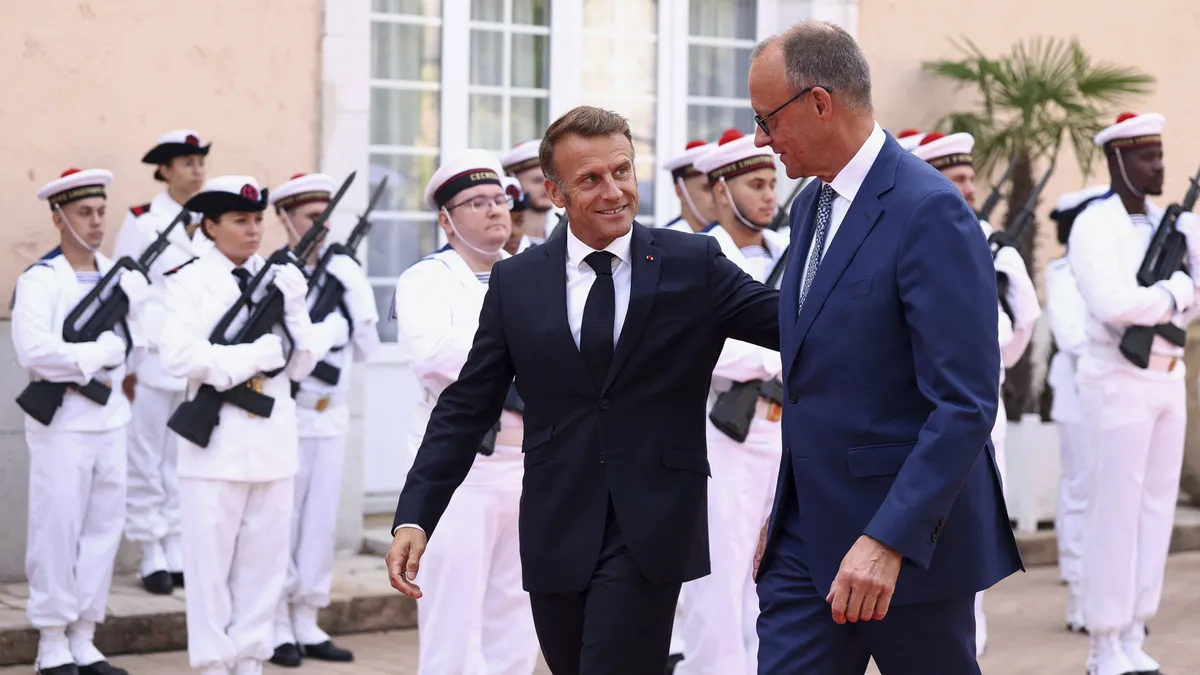The thunderous declarations that followed a Franco-German summit over the summer offered hopes of a momentous reconciliation on energy policy. Yet just over a month after the event, cracks are beginning to show, and confusion reigns over the exact scope of their delicate deal.
Gathered in the Mediterranean port of Toulon on 29 August, leaders from both countries weren’t shy about their ambitions. “The Franco-German motor has started up again,” Germany’s Friedrich Merz told the press, while his French counterpart, Emmanuel Macron, announced a “realignment of energy policy” — an aspect on which Paris and Berlin haven’t always seen eye to eye.
Merz and Macron’s official statement pledged to strengthen bilateral coordination on energy, and committed the EU’s two biggest economies to “lead the way in shaping a competitive, secure, sustainable and decarbonised European energy market.”
A reference to ending discrimination between forms of low-carbon energy was a nod in the direction of France, the EU’s nuclear champion, and it was agreed to by one of the bloc’s staunchest opponents of fission power.
While Paris has fought for years to get the EU Commission to embrace carbon-free nuclear power as an integral part of its energy transition agenda, the Germans have long favoured renewables.
Sturm und Drang
The deal took place against a turbulent domestic backdrop.
In Paris, political turmoil has seen four different prime ministers serving in just over one year.
Between the lines of the Toulon communique, the entourage of France’s then-energy minister Marc Ferracci saw a trade-off of potentially “historic” proportions. The minister has been serving in a caretaker capacity since François Bayrou was toppled on 8 September; at the time of writing, Ferracci’s fate is unclear.
Berlin’s apparent nuclear U-turn, meanwhile, could be partly explained by the arrival to power of Merz’s conservative-led coalition government, more attuned to economic than to environmental concerns.
The April coalition deal, agreed between the CDU/CSU conservatives and the centre-left social democrats (SPD), includes plans to develop 20 GW of new gas capacity by 2030.
But Berlin will need outside support for that plan — not least given the tension with Brussels’ push to shift away from fossil fuels.
Horsepower trading: nuclear for gas
In particular, Germany needs the European Commission to clear a capacity mechanism to secure financing for these gas-fired power stations.
In theory, that’s a technocratic decision for the Commission’s powerful competition directorate DG COMP.
But for one German industry source, it is clear that “the Germans need the support of the French.” The Toulon summit, the source added, marked “the return of the pro-gas, pro-nuclear coalition at the European level.”
Is there a grand bargain at play here? Ferracci hinted as much in September, telling the press: “Recognising the role of nuclear power in France means, in turn, recognising Germany’s strategy, which is based on hydrogen- and gas-fired power plants to generate electricity.”
In a September statement, Ferraci’s cabinet said that Paris and Berlin were in “complete agreement” that upcoming EU legislation should not include “a fourth renewable energy directive, but rather a new directive [...] that is technologically neutral.”
This would be a win for the French, who want to see EU energy targets expressed in terms of low-carbon energy, rather than in shares of renewables.
An official at France’s economy ministry said “[Merz’s] chancellery and minister Reiche have concluded the deal and want to implement it ... and in the end, they are the ones who will decide.”
“There is indeed an agreement that has been 100% validated at the political level,” the official added.
The Germans have been more cautious about the significance of any agreement, though. Even if officially sanctioned by Merz and Macron, any details would have been agreed at a personal level between Ferracci and his German counterpart, the CDU’s Katherina Reiche.
In a written reply about the existence of such a deal, a spokesperson for Germany’s federal ministry of economic affairs and energy told Contexte: “There was no agreement on a specific outcome of the working process or a specific design of the 2040 [climate] target architecture”, adding that the focus was on closer cooperation on EU energy matters.
A source within Germany’s environment ministry was more direct: “Nobody told us” about any such deal.
Those discrepancies haven’t gone unnoticed.
At an informal gathering of energy ministers in Copenhagen, ten days after the Toulon meeting, witnesses to closed-door discussions detected conspicuous discord between French and German officials. Laurent Kueny, who's director for energy in France’s energy and climate directorate-general, welcomed a Franco-German agreement on transitioning to “low-carbon” targets, according to several participants.
Yet when his German counterpart, Christian Schmidt, took the floor, Schmidt’s discomfort was palpable, according to those present. Though citing both nuclear and renewables, he avoided any mention of low-carbon targets, the sources said.
Outside of Ferracci’s close circle, other French officials are also cautious, with sources in other ministries declining to confirm Germany’s shift towards Paris’ coveted low-carbon paradigm. One source said “we’re not quite there” on agreeing to a low-carbon directive; another suggested there’s a divergence between the openness of the political class, and the caution of their administrations.
French sangfroid, German angst
These mixed signals have proven difficult for the French to interpret, not least given the challenge of understanding Germany’s convoluted political system. A source in Paris says there were “a lot of misunderstandings” in the run-up to Toulon.
For one thing, Germany’s public administrations don’t always move in tandem with changes in political leadership, which can result in conflict between ministers and the rank and file.
Reiche “isn't really in sync with her department’s administration”, one German source said of the relatively pro-nuclear minister.
Another challenge for Reiche lies with her left-wing coalition partner, the SPD. “There is a split over nuclear within the German government: the social democrats remain strongly opposed, while the CDU is more open — but nothing was agreed during the coalition talks,” said Linda Kalcher, executive director of EU think tank Strategic Perspectives.
The SPD’s Carsten Schneider — who, as Germany’s SPD environment minister, is responsible for nuclear safety — is also no fan of fission.
In the past, he has publicly opposed Reiche on the subject. In May, he pushed her to backtrack after she said she was open to allowing EU funding for nuclear energy. Several sources told Contexte that Schneider was not in the loop ahead of Toulon.
According to Kalcher, this is an issue on which the SPD could decide to go head-to-head with its coalition colleagues.
High-level moves
Whatever the politics, the high-level signalling so far suggests the plan is still on track.
In a 1 October interview with German daily FAZ, Macron said he was “convinced” that Franco-German differences on nuclear were a thing of the past.
Several German sources also told Contexte that Merz has now mastered the art of using international deals to steer the agenda in his favour back at home. If so, this marks a shift: shortly after he was sworn in, Merz had to pull the plug on a joint Franco-German declaration because he’d failed to get prior coalition approval. The document, obtained by Contexte, would have pledged to abandon a future EU renewable energy directive in favour of “a single low-carbon target”.
The question is whether the SPD will eventually fall in line behind any Franco-German deal this time round.
A German industry source points out that, during budgetary debates, the CDU made concessions to the S&D in areas such as unemployment benefits. “They may seek to make up for this with other measures, outside the energy sector, to gain flexibility on nuclear power and low-carbon energy,” the source said.
Others believe that, even without the SPD’s blessing, a deal brokered by Merz and Macron might be enough to persuade the European Commission president — herself from the CDU — to abandon her renewable targets, in favour of a more Parisian approach.



